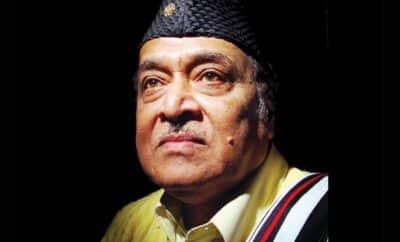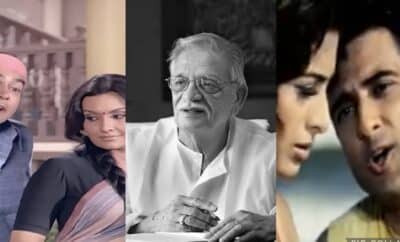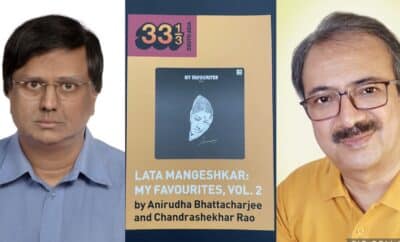Song Sketch
Tere Bina Zindagi Se Koi – Aandhi – Autumn Amour
Autumn – the transition of monsoon to winter. Crisp, clear and cooler days. The foliage boasts of spectacular red, orange and yellow colours. As John Keats says in his poem, To Autumn – Season of mists and mellow fruitfulness. But Autumn symbolically is more profound. Just as nature, humans too, experience autumn. Autumn represents maturity and adulthood. Life prepares for old age as the chilly autumn progresses. Humans tend to look inwards, considering the choices made, knowing that life has been a gift. Cleaning the old cobwebs and decluttering the minds as leaves fall gracefully on the ground. A season of plentiful, abundance and ripening. A season of decline and decay. With the yellow leaves falling, autumn also associates with bareness, absence and starkness.
As Shakespeare points out in the Sonnet 73 –
That time of year thou mayst in me behold
When yellow leaves, or none, or few, do hang
Upon those boughs which shake against the cold,
Bare ruined choirs, where late the sweet birds sang.
In me thou see’st the twilight of such day
As after sunset fadeth in the west;
Which by and by black night doth take away,
Death’s second self, that seals up all in rest….
In other words, Autumn can also be called the twilight of life. Everything matures, so does love. What remains is the memory of youthful love. With love in the past, comes blaming, complaining and lamenting.
And Gulzar says –
Tere bina zindagi se koi
Shikwa toh nahin
Shikwa nahin, shikwa nahin…
Aarti (Suchitra Sen) and JK (Sanjeev Kumar) have a past together. They have been in deep love so much that they decide to get married despite their contrasting backgrounds. Beginning with all sweet fanning, fawning and blandishing, their life together enters a phase where perspectives lead to clashing egos. Ambition replaces love and everything goes topsy turvy. Soon they enter a phase where they feel life without each other will be much better than with each other. Paths separate and each finds his/her own way, leaving love on the bent road.
But years later when life brings them face to face again, they realise how they have missed each other in life. Dark monsoon clouds give way to a clear cerulean sky of autumn. A clearer mature mind perceives the years wasted without each other. Times when they had missed each other. Thoughts break way to very Gulzarish lines –
Tere bina zindagi bhi lekin
Zindagi toh nahin….
Life has no meaning without you. Life is not life without you.
Typical wordplay by Gulzar, this time the word being zindagi. The song begins with vibraphone played by Buji Lord and the african harp followed by sitar and the sweet alto switch flute by Manohari Singh. A set of violins and sitar again and Lata Mangeshkar begins the song like a live wire. You can feel the regret, the pain of Aarti. Caught in between memories of the past and the bitter present, Aarti and JK spend some quality time with each other. Bass guitar by Charanjit Singh throughout the song keeps in tune with the memories and regret and rhythm guitars by Bhanu Gupta and Binoy and accordion by Kersi Lord are in harmony with their hearts.
Kaash aisa ho, tere kadmon se
Chun ke manzil chale
Aur kahin duur kahin
Tum gar saath ho
Manzilon ki kami toh nahin…
Suno Aarti, ye jo phoolon ki belein nazar aati hai na, darasal yeh belein nahin hain, arbi mein aayatein likhi hain, isey din ke waqt dekhna chahiye, bilkul saaf nazar aati hain…Din ke waqt ye saara paani se bhara rehta hai…Din ke waqt jab yeh fuvare…
Din ki baat kyun kar rahe ho, kahan aa paaungi main din mein?
Ye jo chand hai na, isey raat mein dekhna..ye din mein nahin nikalta hai…
Ye toh roz nikalta hoga?
Haan, lekin beech mein amavas aa jaati hai, waise to amavas 15 din ki hoti hai..lekin is baar bahut lambi thi…!
Nau baras lambi thi na?
The song sprinkled with dialogues in between amplifies the love, intensity and regret of the situation. They meet after 9 years of separation and hence the amavas of 9 long years.
(The dialogues weren’t taken well by Pancham, who is the music director here. He had completely opposed the idea by saying famously to Gulzar – Do you have any idea of sur and taal?You cut in with your dialogue anywhere you want. It’s not done!)
That Aarti and JK are still in a relationship, is hidden from the world. Just like a love affair which they want to keep as a secret so that it doesn’t muddle in Aarti’s political career. She remains his amour towards the autumn of their life. An Autumn Amour.
Suchitra Sen and Sanjeev Kumar look like a pair of Sarus cranes, who give the trumpeting call for mating with elaborate dance moves (here with their expressions) under the silver radiance of the autumn moon.
Jee mein aata hai, tere daman mein
Sar chhupa ke hum
Rote rahein, rote rahein,
Tere bhi aankhon mein, aasuon ki
Nami toh nahin….
Surrendering to the situation with beauty and balance, their autumn minds offer clarity and calmness after the disorderly and turbulent past. They know they have to handle the situation quietly. There’s not much to complain about.
Pancham adds more instruments to the song. There’s maadal, tabla and cellos, enhancing the melody throughout the song. They bring about chaos and calmness at the same time. The song was originally done in Bangla as a pujo song – Jete jete pothe…which Gulzar had heard when he had visited Pancham and he insisted on having the tune for this song.
Tum jo keh do toh
Aaj ki raat, chaand doobega nahin
Raat ko rok lo
Raat ki baat hai aur zindagi
Baaki toh nahin…
If Lata Mangeshkar is a live wire, Kishore Kumar is the dazzling spark at the ends of the wire. There seldom might be a music lover who doesn’t get goosebumps at Kishore Kumar’s entry into the song.
In the song, the last stanza highlights the fact that Aarti cannot come to meet JK in broad daylight and yet they want to live together forever – Raat ko rok lo…
Aandhi is one such film where the novel Kaali Aandhi by Kamleshwar was written after the film. As is known, the film is not based on Indira Gandhi’s life but she certainly was a role model while writing Aarti’s character. Gulzar had written a major part of the script at a hotel in Bhopal. He was diligently served there by a waiter whose name was JK. Gulzar thus named Sanjeev Kumar’s character JK, as a tribute to the waiter’s love and care.
Aandhi also serves as a peak point for Gulzar and Pancham together. Music lovers (not just Gulzar and Pancham fans) time and again have vouched for the quality of lyrics and music for all its songs.
Autumn, a subdued phase in the human lifespan when the prime has passed. Not to have opinions about each other but simply existing for each other, enjoying and feeling close without any expectation of reciprocation. It is the season of maturity, preservation and reconnection. Healing your past and reconciling with your present.




Pratik
July 23, 2024 at 1:36 pm
Beautiful. Mesmerising. Ethereal. Words might fall short of describing the beauty of this writeup. To capture an emotion with the perfect phrases is near impossible. But it’s been done here. The autumn of life has rarely been described better. Introspective, nostalgic and wistful, this is perfect justice to the magic of Gulzar Pancham Kishore Lata Sanjeev and Suchitra. An absolute delight to experience
Deepa
July 23, 2024 at 1:48 pm
Thank you. This one song is very close to my heart. It is a refined example of a lyricist and a music director being on the same level of aesthetics.